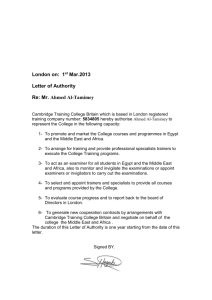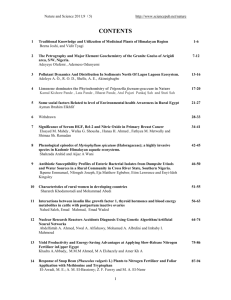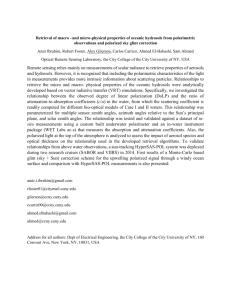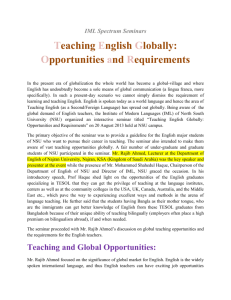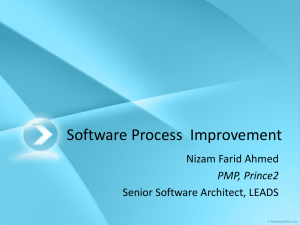Education - UCSB Computer Science
advertisement
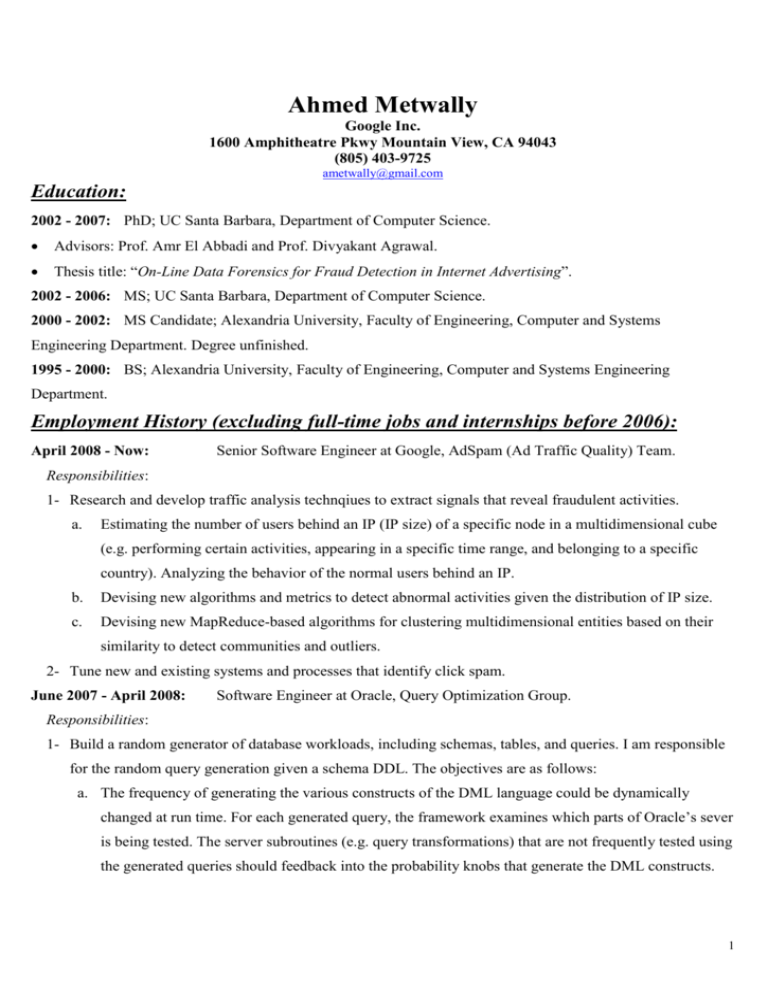
Ahmed Metwally Google Inc. 1600 Amphitheatre Pkwy Mountain View, CA 94043 (805) 403-9725 ametwally@gmail.com Education: 2002 - 2007: PhD; UC Santa Barbara, Department of Computer Science. Advisors: Prof. Amr El Abbadi and Prof. Divyakant Agrawal. Thesis title: “On-Line Data Forensics for Fraud Detection in Internet Advertising”. 2002 - 2006: MS; UC Santa Barbara, Department of Computer Science. 2000 - 2002: MS Candidate; Alexandria University, Faculty of Engineering, Computer and Systems Engineering Department. Degree unfinished. 1995 - 2000: BS; Alexandria University, Faculty of Engineering, Computer and Systems Engineering Department. Employment History (excluding full-time jobs and internships before 2006): April 2008 - Now: Senior Software Engineer at Google, AdSpam (Ad Traffic Quality) Team. Responsibilities: 1- Research and develop traffic analysis technqiues to extract signals that reveal fraudulent activities. a. Estimating the number of users behind an IP (IP size) of a specific node in a multidimensional cube (e.g. performing certain activities, appearing in a specific time range, and belonging to a specific country). Analyzing the behavior of the normal users behind an IP. b. Devising new algorithms and metrics to detect abnormal activities given the distribution of IP size. c. Devising new MapReduce-based algorithms for clustering multidimensional entities based on their similarity to detect communities and outliers. 2- Tune new and existing systems and processes that identify click spam. June 2007 - April 2008: Software Engineer at Oracle, Query Optimization Group. Responsibilities: 1- Build a random generator of database workloads, including schemas, tables, and queries. I am responsible for the random query generation given a schema DDL. The objectives are as follows: a. The frequency of generating the various constructs of the DML language could be dynamically changed at run time. For each generated query, the framework examines which parts of Oracle’s sever is being tested. The server subroutines (e.g. query transformations) that are not frequently tested using the generated queries should feedback into the probability knobs that generate the DML constructs. 1 These knobs should automatically adapt and generate queries with constructs that test the non-tested server subroutines. b. The semantic context of the query should be discoverable by traversing the parse tree. Hence, any part of the query can be altered while not violating the semantic correctness of the query. The goal is to grow the complexities of the generated queries gradually for easier debugging of queries causing the server to crash or producing wrong results October 2006 - March 2007: Internship at Ask.com. Responsibilities: 1- Designing and implementing a new approximate algorithm (in C++) for counting the number of distinct elements in a huge dataset using only one scan on the data and limited space. Doing the statistical analysis to prove the error guarantees. Implementing all the existing algorithms in the stream distinct counting literature to compare the experimental results on real data. 2- Analyzing customer behavior, and designing a metric to measure customer retention. 3- Assisting Divyakant Agrawal (Vice President of Warehousing) in designing a warehouse of click streams. Jun 2006 - Sep 2006: Internship at Google Inc., Infrastructure Division, Logs Analysis Team. Responsibilities: 1- Designing and implementing a C++ library for stream algorithms over variable-sized sliding windows. Designing and implementing algorithms to find approximate frequent elements and exact Min/Max-k elements in amortized constant time per stream element. Publications: Ongoing Research: [PMPFS] Spiros Papadimitriou, Ahmed Metwally, Jia-Yu Pan, Christos Faloutsos, and Ramakrishnan Srikant: “Practical Forecasting for Noisy Time Series”. Submitted for publication. [WMP] Ye Wang, Ahmed Metwally, and Srinivasan Parthasarathy: “MAPSS: All-Pair Similarity Search in Metric Spaces Using MapReduce”. Submitted for publication. [MAEE] Ahmed Metwally, Divyakant Agrawal, Amr El Abbadi, and Fatih Emekci: “Why Go Logarithmic if We Can Go Linear? Reviving Linear Counting for Stream Applications”. Journal Manuscript under preparation. [EMAE] Fatih Emekci, Ahmed Metwally, Divyakant Agrawal, and Amr El Abbadi: "ABACUS: A Distributed Middleware For Privacy Preserving Data Sharing Across Private Data". Journal manuscript under preparation. 2 Journal Articles and Book Chapters: [MF12] Ahmed Metwally, and Christos Faloutsos: “V-SMART-Join: A Scalable MapReduce Framework for All-Pair Similarity Joins of Multisets and Vectors”. PVLDB Proceedings of the Very Large Data Bases Endowment, to appear, 2012. [AEEMW11] Divyakant Agrawal, and Amr El Abbadi, Fatih Emekci, Ahmed Metwally, and Shiyuan Wang: “Secure Date Management Service on Cloud Computing Infrastructures”. Springer Publishers’ New Frontiers in Information and Software as Services - Service and Application Design Challenges in the Cloud, Divyakat Agrawal, K. Selçuk Candan and Wen-Syan Li (Eds.), pages: 57-80, 2011. [M09] Ahmed Metwally: “Frequent Items on Streams”. Springer Publishers’ Encyclopedia of Database Systems, Tamer Özsu and Ling Liu (Eds.), pages: 1175-1179, 2009. [MEAE08] Ahmed Metwally, Fatih Emekci, Divyakant Agrawal, and Amr El Abbadi: “SLEUTH: Single- pubLisher attack dEtection Using correlaTion Hunting”. PVLDB Proceedings of the Very Large Data Bases Endowment, Vol. 1, No. 2, pages: 1217-1228, 2008. [MAE06] Ahmed Metwally, Divyakant Agrawal, and Amr El Abbadi: “An Integrated Efficient Solution for Computing Frequent and Top-k Elements in Data Streams”. ACM TODS Transactions On Database Systems, Vol. 31, No. 3, pages: 1095-1133, September 2006. Conference Papers: [SM12] Fabio Soldo, and Ahmed Metwally: “Click Fraud Detection Based on Click Size Distribution”. IEEE INFOCOM International Conference on Computer Communications, Joint Conference of the IEEE Computer and Communications Societies, to appear, 2012. [MP11] Ahmed Metwally, and Matt Paduano: “Estimating the Number of Users behind IP Addresses for Combating Abusive Traffic”. ACM SIGKDD International Conference on Knowledge Discovery and Data Mining, pages: 249-257, 2011. [KTPMDCB09] Carmelo Kintana, David Turner, Jia-Yu Pan, Ahmed Metwally, Neil Daswani, Erika Chin, and Andrew Bortz: “The Goals and Challenges of Click Fraud Penetration Testing Systems”. IEEE ISSRE International Symposium on Software Reliability Engineering, 2009, paper number 187. Available at http://www.google.com/adwords/adtrafficquality/tech.html. [AEEM09] Divyakant Agrawal, Amr El Abbadi, Fatih Emekci, and Ahmed Metwally: “Database Management as a Service: Challenges and Opportunities”. IEEE ICDE International Conference on Data Engineering, pages: 1709-1716, 2009. 3 [MAE08] Ahmed Metwally, Divyakant Agrawal, and Amr El Abbadi: “Why Go Logarithmic if We Can Go Linear? Towards Effective Distinct Counting of Search Traffic”. EDBT International Conference on Extending Database Technology, pages: 618-629, 2008. [MAEZ07] Ahmed Metwally, Divyakant Agrawal, Amr El Abbadi, and Qi Zheng: “On Hit Inflation Techniques and Detection in Streams of Web Advertising Networks”. IEEE ICDCS International Conference on Distributed Computing Systems, paper number 52, 2007. [BMAE07a] Nagender Bandi, Ahmed Metwally, Divyakant Agrawal, and Amr El Abbadi: “Fast Algorithms for Data Streams using Associative Memories”, ACM SIGMOD International Conference on Management of Data, pages: 247-256, 2007. [BMAE07b] Nagender Bandi, Ahmed Metwally, Divyakant Agrawal, and Amr El Abbadi: “TCAMconscious Algorithms for Data Streams”, IEEE ICDE International Conference on Data Engineering, pages: 1342-1344, 2007. [MAE07] Ahmed Metwally, Divyakant Agrawal, and Amr El Abbadi: “DETECTIVES: DETEcting Coalition hiT Inflation attacks in adVertising nEtworks Streams”. The International WWW Conference, pages: 241-250, 2007. [MAE05a] Ahmed Metwally, Divyakant Agrawal, and Amr El Abbadi: “Using Association Rules for Fraud Detection in Web Advertising Networks”. VLDB International Conference on Very Large Data Bases, pages: 169-180, 2005. [MAE05b] Ahmed Metwally, Divyakant Agrawal, and Amr El Abbadi: “Duplicate Detection in Click Streams”. The International WWW Conference, pages: 12-21, 2005. [MAE05c] Ahmed Metwally, Divyakant Agrawal, and Amr El Abbadi: “Efficient Computation of Frequent and Top-k Elements in Data Streams”. ICDT International Conference on Database Theory, pages: 398-412, 2005. [FAEM04] Ying Feng, Divyakant Agrawal, Amr El Abbadi, and Ahmed Metwally: “Range CUBE: Efficient Cube Computation by Exploiting Data Correlation”. IEEE ICDE International Conference on Data Engineering, pages: 658-670, 2004. Invited Talks (excluding presentations of conference papers and job talks): “Can the Size of IP Addresses Help Click Fraud Detection”. Google company-wide tech-talk, March 2012. “Click Fraud Detection Based on the Size of IP Addresses”. University of California, Santa Barbara, Department of Computer Science, February 2012. “Large Scale Estimation and Forecasting in Practice”. The 3rd Workshop on Large-scale Data Mining: Theory and Applications (LDMTA 2011) in conjunction with SIGKDD 2011. 4 Academic Services: Program Committee Member: SIGMOD 2010. Dissertation Committee Member: Fabio Soldo, UCI, 2011. Journal Reviewer: ACM TODS Transactions On Database Systems. ACM TOSN Transactions On Sensor Networks. CACM Communications of the ACM. The VLDB Journal IEEE TKDE Transactions on Knowledge and Data Engineering IEEE Communications Letters External Reviewer: with Prof. D. Agrawal, Prof. A. El Abbadi, and Dr. Mohamed ElFeky, ACM-GIS, EDBT, ICDCS, ICDE, ICDT, PODS, SIGMOD, VLDB, WWW. Mentorship: Mentored interns Amr Ebaid (Purdue, Summer 2009), Fabio Soldo (UCI, Summer and Fall 2010), and Ye Wang (OSU, Summer 2011) in the Ad Traffic Quality Team at Google. 5


